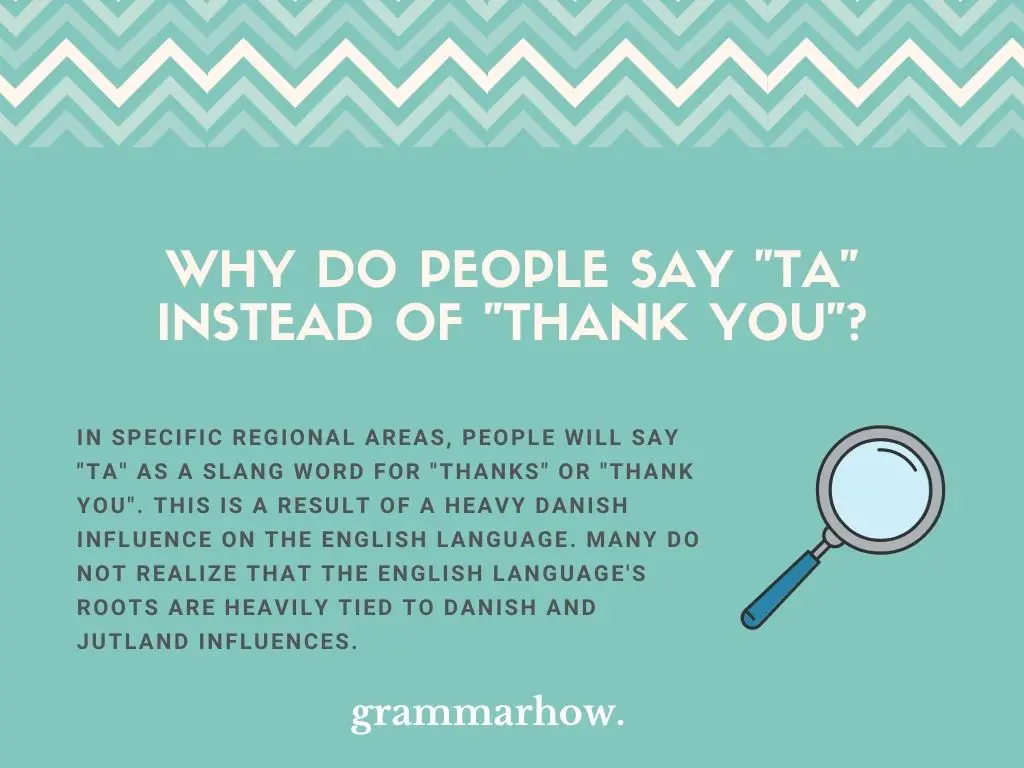Although uncommonly heard in conversation or seen in writing, there are folks throughout the world that utilize the term “ta”. While many people are unaware of the meaning, this is simply another way of depicting gratitude or saying “thank you”.
Why Do People Say “Ta” Instead Of “Thank You”?
In specific regional areas, people will say “ta” as a slang word for “thanks” or “thank you”. This is a result of a heavy Danish influence on the English language. Many do not realize that the English language’s roots are heavily tied to Danish and Jutland influences.

With the commonality of the use of slang words increasing over the last century, so did the use of the word “ta”. This is why many people opt for the utilization of the slang word “ta” as opposed to the full version of “thank you”.
What Is The Origin Of “Ta” Meaning “Thank You”?
It is believed that because of the heavy Danish influence on the English language, the Danish word for “thanks”, “tak”, became very commonly used. However, in Scotland and Northern England, it was often that the letter “k” was dropped at the end of the word – making the word pronounced, “ta”.
The dropping of the letter “k” was due to the literal verbal pronunciation of the word during the time of old English and Middle English. This is why many people believe that the word “ta” is considered to have originated from the Danish language. One can also note that “takk” is Norwegian and “tack” is Swedish – showcasing strong Scandinavian roots and influence as well.
However, it is also considered to be possible that the slang term “ta” is derived from the Scottish Gaelic word “tapadah leibh” (TAH-puh LEH-eev), which means “thank you”.
Lastly, there are some folks who even believe that “ta” is an infantile version or way of saying “thank you” in the UK. This is often misconstrued with the phrase “ta ta” which can be used as a goodbye or “tata” which some parents use to have their children let go or drop something they shouldn’t be holding.
Is “Ta” British Slang?
“Ta” is considered to be British or UK regional slang for “thank you”. This use of “ta” is considered to be very widespread in the North of England and in Wales. It is thought of as being informal, but still considered a courteous way of showing gratitude amongst adults.
Many British or Northern English people utilize “ta” as merely a spoken abbreviation for “thank you” or “thanks, it is not uncommon to see this term utilized in online chatrooms and UK games of Scrabble alike.
Is “Ta” Used In Australia?
“Ta” is also used extensively in Australia. This is majorly due to the large British influence on the country. However, many Australians also have Celtic ancestry, which brings forth the possibility that the word originated from the Irish Gaelic word for yes, which is also “ta”.
This means that while many Australians choose to use the word “ta” as a shortened or slang form of “thank you”, others may use it as a different term for an affirmative answer or yes.
Is “Ta” Used In Other Countries Besides The UK and Australia?
In New Zealand, the term “ta” is also used as a shortened or abbreviated version of “thank you” or “thanks”. Much like Australia, we can consider this to be due to a large British and Danish influence on the Kiwi culture.
Similarly, the term “ta” may be heard by folks who are from the UK who are traveling or living abroad. This makes it so the term “ta” has the potential of being heard in many different parts of the world.
Is “Ta” Mostly Used In Texting?
While the term “ta” is used verbally in the UK and Australia to mean “thank you”, it has also become a very popular acronym to be used in a text, chatrooms, and emails alike. Because of this, the acronym is used globally, regardless if English is your native language or not.
When folks choose to use “ta” as an acronym, it is commonly written in capital lettering, “TA”. Also, slightly different than the verbal “ta”, this acronym is generally used to represent the phrase “thanks a lot” or the phrase “thanks again”.

Martin holds a Master’s degree in Finance and International Business. He has six years of experience in professional communication with clients, executives, and colleagues. Furthermore, he has teaching experience from Aarhus University. Martin has been featured as an expert in communication and teaching on Forbes and Shopify. Read more about Martin here.
